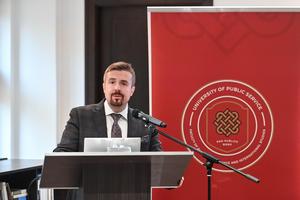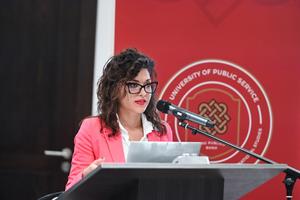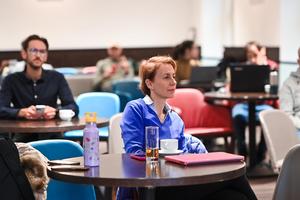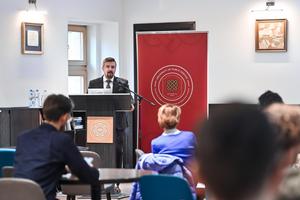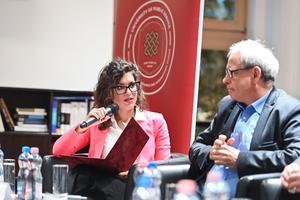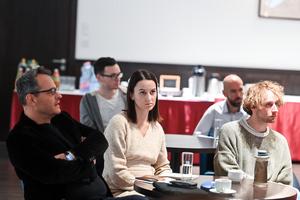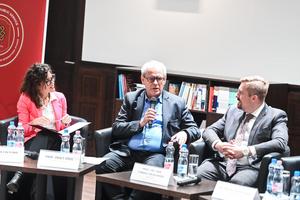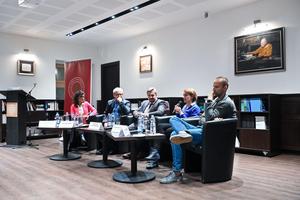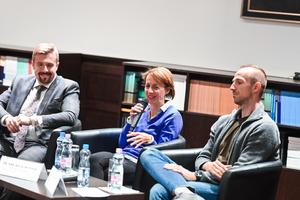The Science and Society Research Group held a conference entitled How Emerging Tech Reshapes Communication and Society on November 14, 2024 in cooperation with the Office of Science Strategy. The aim of the conference was to present the impact of emerging technologies such as artificial intelligence (AI) on science and science communication and, in a broader sense, on social transformation processes.
In her opening speech, dr. Nóra Falyuna, head of the Science and Society Research Group, emphasized that Ludovika University of Public Service (LUPS) is at the forefront of research on digital technologies. In line with this, the Research Group focuses on the relationship and communication between science and society, especially on questions concerning the challenges and opportunities that emerging technologies pose for scientific work, knowledge production, and science communication.
In his presentation “Research 360°: A biometric approach to social science in the era of disruptive technologies (from games and VR to AI) – triangulation prism” the keynote speaker at the symposium, dr. habil. Tomasz Gackowski provided insight into the developments in AI technologies, explaining that debate on the usefulness and applicability of artificial intelligence is ongoing. Moreover, that while scientific and higher education institutions are interested in both research on and the application of AI, they need also to identify the challenges in its use, such as in the issues of trust and ethics, the protection of privacy, and the sustainability of artificial intelligence ecosystems. At the same time, as technologies continue to develop, the demand for innovative, multidimensional research methods is increasing. Professor Gackowski went on to posit that combining biometric tools and disruptive technologies such as virtual reality (VR), artificial intelligence, and gaming platforms with traditional qualitative and quantitative techniques can provide deeper insight into the phenomena studied by the social sciences. With regard to the growing interest in synthetic media generated by artificial intelligence, he emphasized that, among other things, studying reactions to media stimulus with approaches and tools of this kind can provide more informed results because biometric data provides objective, real-time insight into physiological responses that reflect emotional reactions and cognitive processing, which gives a more holistic view of human behavior.
After the presentation, a panel discussion took place with dr. Nóra Falyuna (head of the Science and Society Research Group and assistant professor at the Department of Social Communication of LUPS), dr. Zsolt Ződi (senior researcher at the Information Society Research Institute of LUPS), dr. habil. Katalin Fehér (associate professor of the Department of Social Communication and Office of Science Strategy), dr. Tamás Tóth (assistant professor at the Department of Social Communication and the deputy head of the Office of Science Strategy at LUPS) and dr. habil. Tomasz Gackowski (professor at the Department of Social Communication and Public Relations of University of Warsaw). Among the topics discussed was the current shift towards data-driven science, which often pushes the social sciences and humanities into the background in research funding. These disciplines, however, have to find a balance between quantitative rigor and qualitative depth of knowledge in order to deal with the technological uncertainties with social and scientific core values.
The basic conclusions of the panel discussion were that generative artificial intelligence and quantum technology will bring intense change in the near future, especially through the growth of synthetic data. Mass media and science fiction narratives also play a key role in shaping visions of the future and spreading disinformation, especially in areas such as biometrics, where the social consequences can be profound. The speakers highlighted the need to be very careful when using generative AI, as its reliability is sometimes seriously flawed. However, alongside the caution, a multidisciplinary approach is unavoidable if scientific work and science communication is to be effective.
